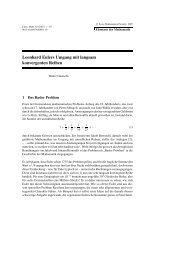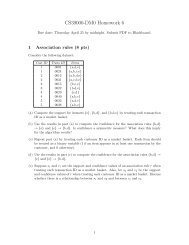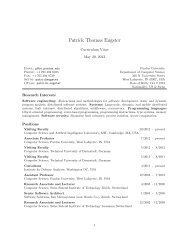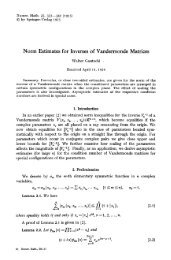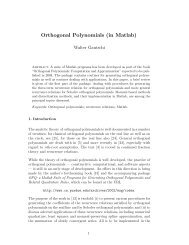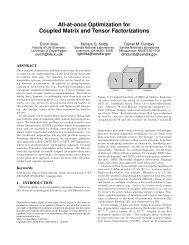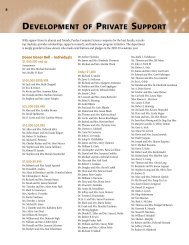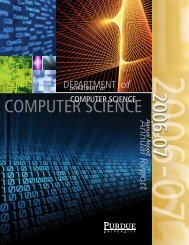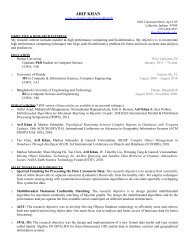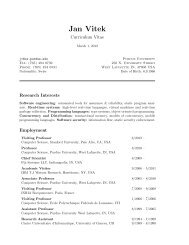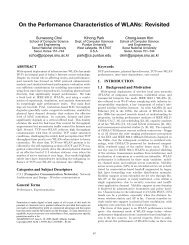CS 2003-2004 Faculty Information - Department of Computer ...
CS 2003-2004 Faculty Information - Department of Computer ...
CS 2003-2004 Faculty Information - Department of Computer ...
Create successful ePaper yourself
Turn your PDF publications into a flip-book with our unique Google optimized e-Paper software.
Bio-sketch:<br />
Dr. Clifton works on challenges posed by novel uses <strong>of</strong> data mining technology, including privacy-preserving data mining,<br />
data mining <strong>of</strong> text, and data mining techniques applied to interoperation <strong>of</strong> heterogeneous information sources.<br />
Fundamental data mining challenges posed by these applications include extracting knowledge from noisy data, identifying<br />
knowledge in highly skewed data (few examples <strong>of</strong> “interesting’’ behavior), and limits on learning. He also<br />
works on database support for widely distributed and autonomously controlled information, particularly information<br />
administration issues such as supporting fine-grained access control.<br />
Prior to joining Purdue, Dr. Clifton was a principal scientist in the <strong>Information</strong> Technology Division at the MITRE<br />
Corporation.Before joining MITRE in 1995,he was an assistant pr<strong>of</strong>essor <strong>of</strong> computer science at Northwestern University.<br />
Selected Publications:<br />
Christopher W. Clifton, “Using Sample Size to Limit Exposure to Data Mining,” Journal <strong>of</strong> <strong>Computer</strong> Security, Volume<br />
8, No. 4, IOS Press, November 2000.<br />
Christopher W. Clifton and Wen-Syan Li, “SEMINT: A Tool for Identifying Attribute Correspondences in<br />
Heterogeneous Databases Using Neural Networks,” Data and Knowledge Engineering, Volume 33, No. 1, Elsevier<br />
Science, Amsterdam, April 2000.<br />
Murat Kantarcioglu and Chris Clifton, “Privacy Preserving Data Mining <strong>of</strong> Association Rules on Horizontally<br />
Partitioned Data,” Transactions on Knowledge and Data Engineering, Volume 16, No. 9, pp. 1026-1037, IEEE<br />
<strong>Computer</strong> Society Press, Los Alamitos, CA, September <strong>2004</strong>.<br />
Douglas E. Comer<br />
Education:<br />
BS, Mathematics and Physics, Houghton College, 1971<br />
PhD, <strong>Computer</strong> Science, The Pennsylvania State University, 1976<br />
Positions:<br />
Distinguished Pr<strong>of</strong>essor <strong>of</strong> <strong>Computer</strong> Science<br />
Pr<strong>of</strong>essor <strong>of</strong> Electrical and <strong>Computer</strong> Engineering (Courtesy)<br />
Bio-sketch:<br />
Pr<strong>of</strong>essor Comer is an internationally recognized expert on computer networking and the TCP/IP protocols. He has<br />
been working with TCP/IP and the Internet since the late 1970s. Comer established his reputation as a principal investigator<br />
on several early Internet research projects. He served as chairman <strong>of</strong> the <strong>CS</strong>NET technical committee, chairman<br />
<strong>of</strong> the DARPA Distributed Systems Architecture Board, and was a member <strong>of</strong> the Internet Activities Board (the group<br />
<strong>of</strong> researchers who built the Internet).<br />
Comer has created courses on TCP/IP and networking technologies for a variety <strong>of</strong> audiences, including in-depth<br />
courses for engineers and less technical courses for others; he continues to teach at various industries and networking<br />
conferences around the world. In addition, Comer consults for private industry on the design <strong>of</strong> corporate networks.<br />
Pr<strong>of</strong>essor Comer is well-known for his series <strong>of</strong> ground breaking textbooks on computer networks, the Internet, and<br />
computer operating systems. His books have been translated into sixteen languages, and are widely used in both industry<br />
and academia. Comer’s three-volume series Internetworking With TCP/IP is <strong>of</strong>ten cited as an authoritative reference<br />
for the Internet protocols. More significantly, Comer’s texts have been used by fifteen <strong>of</strong> the top sixteen <strong>Computer</strong><br />
Science <strong>Department</strong>s listed in the U.S. News and World Report ranking.<br />
17



